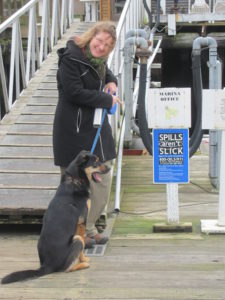Fuels and oils that get into our water are toxic and can do a lot of damage. They harm marine life, ruin habitat and make a smelly mess.
The primary source of oil pollution in BC waters comes from small spills from recreational activities, passenger traffic, and fisheries, more so than oil tankers and commercial cargo ships. Fuel docks and derelict vessels are particularly problematic. The highest intensity of fuel discharges occurs right here in Georgia Strait.
Fuel and oil spills can happen for a variety of reasons: carelessness during fuelling, leaks, poorly maintained engines, releases from derelict vessels, emptying contaminated bilge water, and even intentional dumping of unwanted fuel.
Clean Marine BC provides boaters and marinas with valuable resources, and engages with other organizations to prevent small spills from recreational vessels.
Georgia Strait Alliance is a member of the Pacific Oil Spill Education and Prevention Team, with representatives from government, industry associations, and non profits from BC, Alaska, Washington, Oregon, and California. Our membership in POSPET fosters sharing of resources, expertise, and ideas on how to prevent small spills, and other boater best practices. Members of POSPET distribute Spills Aren’t Slick signage, brochures, and decals which raise awareness of preventative measures and the cumulative impact of many small spills. POSPET’s easy to remember hotline allows boaters to report all spills (even smaller than a litre) anywhere from BC to California at 1-800-OILS-911.
There are lots of great tips on preventing small spills and reducing boater emissions in our Guide to Green Boating.
Fuel and oil spill prevention, and clean up tips and information:
- Never attempt to contain or clean up spilled gasoline, as it is highly flammable!
- Never use soap to disperse a spill. It is illegal and only adds more pollution to the water.
- Confirm a disposal location before changing your oil, and for stale or contaminated fuel, oil filters and other waste.
- Do not mix fuel and oil.
- Wring out and reuse oil absorbents.
- Greening Up that Sheen
- Fueling tips, efficiency, alternative fuels, spill response, and more (Boat U.S. Foundation)
- Engine maintenance (Boat U.S. Foundation)
- How to prevent discharges of oil at sea (Global Marine Oil Pollution Information Gateway)
- 2-stroke Engines Pollute 2-much (San Diego Earth Times)
Fuel and oil spill prevention, and clean up products:
- Discount on spill kits available to our Clean Marine BC marinas through our CMBC benefits program from
West Coast Spill Supplies – spill kits, absorbents and spill response products - Ace Bilge Pro – effective, cost saving, and compliant bilge oil removal technology
- Attwood Marine Products – fuel demand valve prevents pressurized fuel from spilling
- GreenBoatStuff.com – oil and fuel spill cleanup supplies and other environmentally friendly boating supplies
- Oil Lift – oil spill and remediation products
- Parker Hannifin – fuel/air separators
- Petro Barrier Systems Inc. – preventing fuel and chemical spills
- Wasp Fueling Systems – for fuel docks and mobile fuelers, to prevent burps, blowbacks, and spills
- Zorbie Products Ltd. – spill response and supplies

